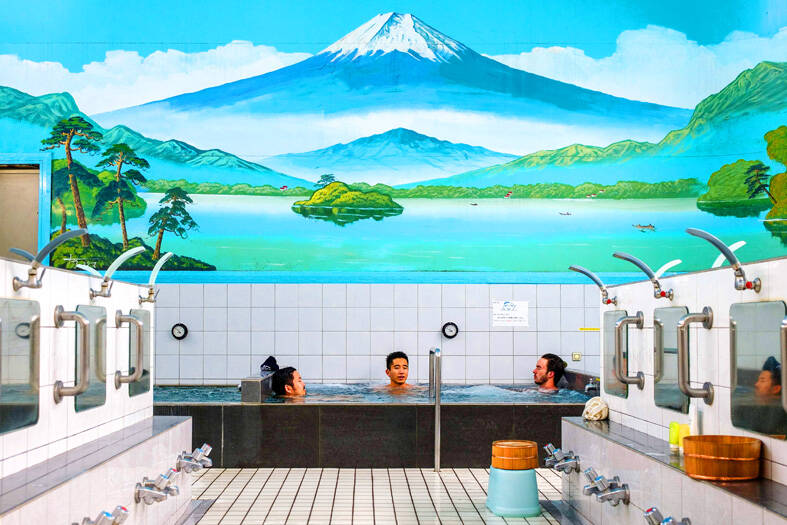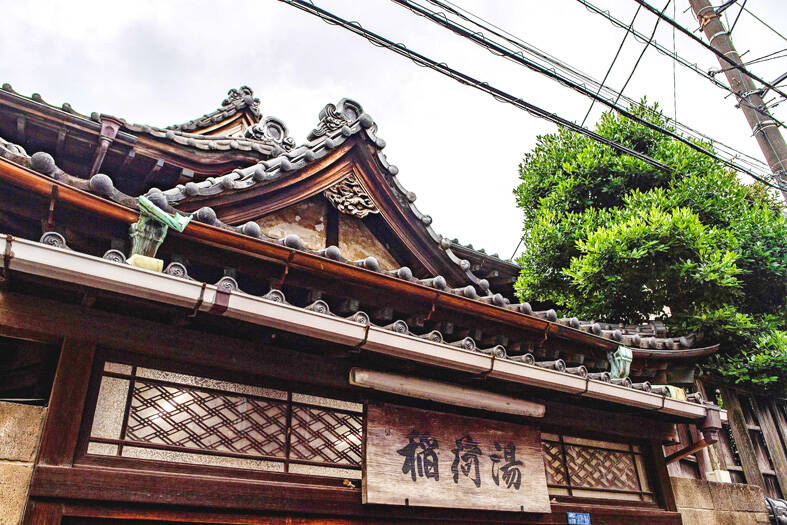Just before it opens each afternoon, elderly residents gather outside one of Tokyo’s last remaining old-style bath houses carrying flannels, soap and shampoo for their regular soak.
With its communal naked tubs, bright mural of Mount Fuji and sliding wooden entrance under a pointed roof, Inariyu is a classic example of a Japanese public bath, or sento.
Once ubiquitous in crowded urban areas, sentos are now closing quickly as more people take baths at home and owners struggle with faltering machinery, high gas prices and a lack of successors, tempting them to sell their valuable land.

Photo: AFP
Nationwide, the number of bath houses has plunged to about 1,800 from a peak of nearly 18,000 in the late 1960s.
However, some such as Inariyu have been given a new lease on life through renovations, while others are reinventing themselves as trendy hangouts or using data analysis to boost business.
One person pushing to save neighborhood baths is Yasuko Okuno, who discovered them as a way to unwind after working late.

Photo: AFP
“Day after day, my mind was tired. Even when I went home, I couldn’t forget about work,” said the 36-year-old writer for the Tokyo Sento Association.
“Then I went to a sento for the first time in a while, and it felt like a weight had lifted. There was a large bath, and the regulars greeted me kindly,” she said.
Over time, “it began to feel like a home from home,” she added.
Japan has never imposed a strict COVID-19 lockdown, and places such as gyms and sentos remained open even when many offices switched to home working and restaurants shortened opening hours.
Masks are commonly worn on trains and in other public places, but there is no requirement to wear them in sentos, although social distancing and quiet bathing are encouraged.
For many elderly people, it is a “daily routine” that they did not want to stop during the pandemic, and some feel safer taking a bath with others around in case they fall, Yasuko said.
Bathhouse closures can erode community ties, said Sam Holden, whose organization Sento & Neighborhood used a grant of about US$200,000 from the World Monuments Fund to renovate Inariyu.
The group strived to keep the cozy, welcoming atmosphere of the bathhouse — built in 1930 in a low-rise area of northern Tokyo where narrow walkways snake between homes.
Inariyu has customers of all ages, including “a lot of elderly people, many of whom might live alone and be prone to isolation,” said Holden, a 32-year-old American who has lived in the capital for nearly a decade.
“My colleagues and I had a sense of urgency in wanting to preserve some of these historic structures before they were redeveloped into apartment complexes and other things,” he said.
Bathers pay ¥500 (US$3.60) to enter the men’s or women’s bath, a fee set by the Tokyo government.
Leaving their shoes in a small locker, they strip off in the changing room and take a shower before climbing into the tubs for a relaxing soak.
Unlike Japan’s hot springs, known as onsen, the water in sentos is usually heated with gas.
Shunji Tsuchimoto, who runs Inariyu with his wife, said that the bathhouse is paying 50 percent more for energy than it did last year.
However, he hopes that holding events in the renovated buildings would raise revenue by drawing younger customers.
“I want them to know this sento culture,” he said.
One sento that has managed to draw a youthful clientele is Koganeyu in eastern Tokyo, which reopened in 2020 after a full makeover.
On a recent Saturday, the bathhouse was packed with young customers drinking craft beer and listening to vinyl records.
Tech worker Kohei Ueda, 25, traveled an hour to use Koganeyu’s sauna with a friend.
“I do have the image of sentos being where grandpas and grandmas gather,” he said.
“But a sento like this that’s more trendy and modern is not like that... I feel more comfortable coming here,” he said.
Kom-pal, another sento, might not have hipster appeal, but 36-year-old owner Fumitaka Kadoya has managed to increase footfall using data-crunching skills he acquired in his previous job as a technician for optical equipment maker Olympus.
Kadoya’s family has run the sento since the 1950s and when he took over three years ago, he set up a database to track information about customers and the timing of their visits.
The data have allowed him to make targeted business decisions, such as hiring female staff to encourage more women to visit and opening on Sunday mornings to ease crowds.
“Sentos have always been a part of Japanese culture,” Kadoya said, and nowadays, leaving everything in a locker while you soak can be a kind of “digital detox.”
“That’s exactly what I think young people need these days,” he said.

Indonesia and Malaysia have become the first countries to block Grok, the artificial intelligence (AI) chatbot developed by Elon Musk’s xAI, after authorities said it was being misused to generate sexually explicit and nonconsensual images. The moves reflect growing global concern over generative AI tools that can produce realistic images, sound and text, while existing safeguards fail to prevent their abuse. The Grok chatbot, which is accessed through Musk’s social media platform X, has been criticized for generating manipulated images, including depictions of women in bikinis or sexually explicit poses, as well as images involving children. Regulators in the two Southeast Asian

COMMUNIST ALIGNMENT: To Lam wants to combine party chief and state presidency roles, with the decision resting on the election of 200 new party delegates next week Communist Party of Vietnam General Secretary To Lam is seeking to combine his party role with the state presidency, officials said, in a move that would align Vietnam’s political structure more closely to China’s, where President Xi Jinping (習近平) heads the party and state. Next week about 1,600 delegates are to gather in Hanoi to commence a week-long communist party congress, held every five years to select new leaders and set policy goals for the single-party state. Lam, 68, bade for both top positions at a party meeting last month, seeking initial party approval ahead of the congress, three people briefed by

The Chinese Embassy in Manila yesterday said it has filed a diplomatic protest against a Philippine Coast Guard spokesman over a social media post that included cartoonish images of Chinese President Xi Jinping (習近平). Philippine Coast Guard spokesman Jay Tarriela and an embassy official had been trading barbs since last week over issues concerning the disputed South China Sea. The crucial waterway, which Beijing claims historic rights to despite an international ruling that its assertion has no legal basis, has been the site of repeated clashes between Chinese and Philippine vessels. Tarriela’s Facebook post on Wednesday included a photo of him giving a

ICE DISPUTE: The Trump administration has sought to paint Good as a ‘domestic terrorist,’ insisting that the agent who fatally shot her was acting in self-defense Thousands of demonstrators chanting the name of the woman killed by a US federal agent in Minneapolis, Minnesota, took to the city’s streets on Saturday, amid widespread anger at use of force in the immigration crackdown of US President Donald Trump. Organizers said more than 1,000 events were planned across the US under the slogan “ICE, Out for Good” — referring to the US Immigration and Customs Enforcement, which is drawing growing opposition over its execution of Trump’s effort at mass deportations. The slogan is also a reference to Renee Good, the 37-year-old mother shot dead on Wednesday in her